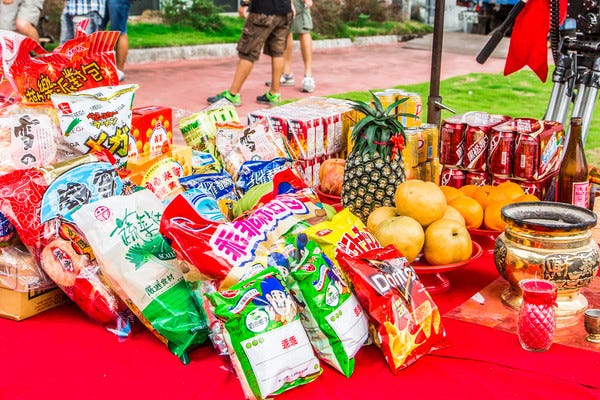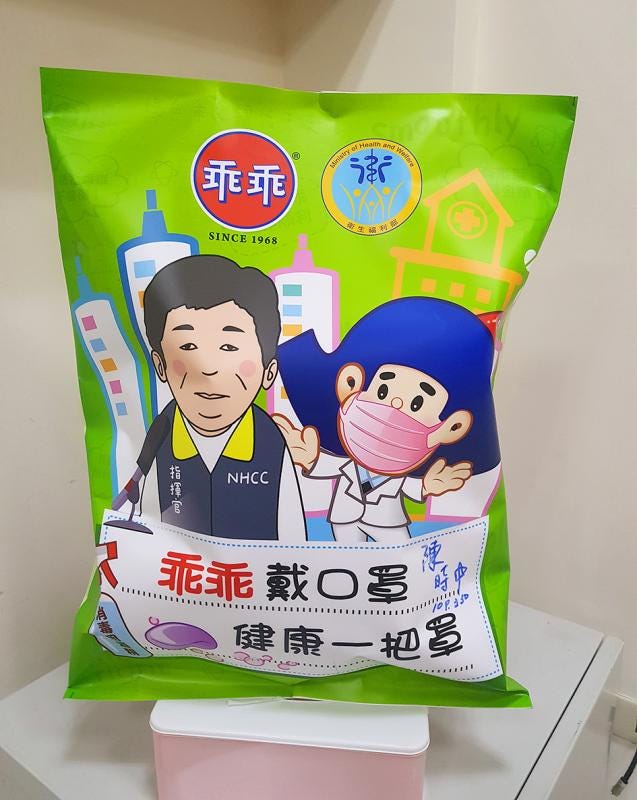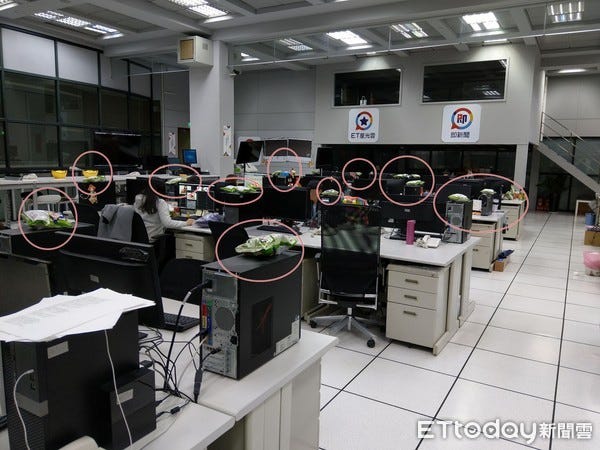乖乖: The Obedient Corn Puff That Keeps Taiwan's Technology in Good Working Order
Plus, a limited edition Kuai Kuai snack drop
This is Yun Hai Taiwan Stories, a newsletter about Taiwanese food and culture by Lisa Cheng Smith 鄭衍莉, founder of Yun Hai. If you aren’t yet a subscriber, sign up here.
We’re watching the post-Pelosi situation in Taiwan closely. Many have asked us if we plan to act on any of the new export bans enacted by China against Taiwanese brands and farmers. We’re going through the lists and determining the best way we can help. Stay tuned. (In case you missed it, see more about the bans here and here.)
In the meantime, we’ve got a very special drop for you: a limited edition flavor of Kuai Kuai 乖乖, the quintessential puffy snack enjoyed by Taiwanese children (and, let’s be honest, adults) for generations. Kuai Kuai does happen to be on the China ban list, but, as you’ll read below, they won't be impacted very much. This launch has been in the works for awhile; it’s one of many special features to come.
Kuai Kuai 乖乖 has a whole lot of legacy for a snack food and plays a large (and somewhat non-intuitive) role in Taiwanese daily life. Read on for the context, or just scroll on to the bottom for the snax we got.
Kuai Kuai 乖乖, simply put, is a corn puff snack, typically offered in cream coconut or five spice flavor. The name (pronounced like the word ‘why’ with a g in front of it, gwhy gwhy) translates to ‘obedient’ or ‘well-behaved’, which is also a Chinese term of endearment for small children, like ‘sweetie’, ‘darling’, etc.
The snack, and the brightly printed foil bag it comes in, has been around since the 60’s and is archetypically Taiwanese. So Taiwanese, that Kuai Kuai Co., Ltd. is not sweating their inclusion in the recent Chinese Pelosi Export Ban list, because only 1% of their sales are outside of Taiwan.

Kuai Kuai 綠乖乖 as Technological Panacea
The coconut (green bag) flavor is credited by many for keeping the island’s IT infrastructure in good working order. According to many an engineer across Taiwan, the green bag has magic properties that influence technology to behave well. Only the green bag though, because green means go, like a green light. Status: Ready. Performance: Optimal. Protocol: Executed. The meaning is so pervasive that the package is now adorned with six green lights, reflecting customer sentiment.
Placing the green Kuai Kuai (綠乖乖) on top of or near a piece of technology should keep everything copacetic, unless of course you use an expired package, or even worse, eat it without replacing it. A yellow bag will cause problems (but may be good in banking situations, because gold), and a red one will result in a breakdown (but is more than suitable for romancing). Yun Hai has personal experience with this. Kuai Kuai rescued our barcode scanner the night before store open, no lie.

The custom runs so deep in IT culture, that even TSMC (you know, Taiwan Semiconductor Manufacturing Company, flash point of the global economy and, as such, geopolitics?) had their own special bag made for employees, after they repaired a production line damaged by a 2016 earthquake in Kaohsiung. The joke has been made, but I’ll make it again: now we know what’s behind all those high yields.

Of course, Taiwan’s immensely talented engineers and tech workers are the real Kuai Kuai here, but the universal aura of the green bag is revealing of the role symbolism, superstition, food, and having fun plays in day-to-day Taiwanese culture.
Did I mention it tastes great too? Have your tech talisman and eat it too (but only after it expires and you’ve replaced the one on your machine).
Kuai Kuai and Ghost Festival 中元節
P.S. It’s Ghost Month according to the Lunar Calendar. In Taoist and Buddhist custom, the 7th lunar month is when the gates between the world of the dead and the living open, and spirits are free to roam the land of life. This is officially celebrated during Ghost Festival 中元節 , which falls on August 12 this year, the 15th day of the 7th lunar month.
Ancestral and deity worship are a part of daily life in Taiwan. However, during the Ghost Festival, all spirits are fed and honored. It’s a bit of a spooky time, because not all the ghosts are thought to be friendly. Some may be motivated by greed or worldly appetites that were never satisfied in life. So, certain activities are taboo during this month, such as weddings, staying out late, taking photos at night, and swimming. The offering tables set up in temples and in front of businesses are for all ghosts (respectfully referred to as good brothers, 好兄弟), and are stocked by the community with enough food and other offerings to keep the 好兄弟 satiated, deflecting potential bad luck from the households of the living.

The green Kuai Kuai package is a standard part of offering tables, along with odd numbers of certain kinds of fruit, incense, and paper money (just enough cash to do some damage but not too much lest the ghosts 好兄弟 decide to stay). Green means go, green means good, green means we will not be led astray.
Kuai Kuai has proudly embraced its importance to the spiritual world and has even made special packages for the occasion.

Kuai Kuai Limited Editions
Kuai Kuai has a (literally) good-spirited branding strategy that hybridizes Taiwanese food culture, folk culture, and current affairs. Special editions include everything from the pro-COVID-vaccine collab with the Ministry of Health to the strawberry flavor, highlighting a prime strawberry-growing region in Miaoli. They started making a series of rice puffs with Taiwan-grown rice, as a point of pride. From my perspective, this hyper-Taiwanese-centric micro-branding creates a strong sense of place, belonging, and togetherness for the community of Kuai Kuai around the world.
A few of their recent releases:




Kuai Kuai Pork Chop Bento Limited Edition Drop
At Yun Hai, we’re dedicated to making out of reach Taiwanese food available to our customers, and today we’re proud to launch a limited edition Kuai Kuai flavor: the recently released Pork Chop Bento 排骨便當. It’s a collaboration with PX Mart 全聯福利中心, Taiwan’s largest supermarket chain, and is made from Taiwanese grown rice. The flavor is based on a classic Taiwanese lunch special: a fried-then-braised pork chop served with sour mustard greens, braised tofu, soy egg, and a bit of steamed broccoli, pictured below. This bento 便當 is popular on the Taiwanese railway (told you the train food was good), but can also be purchased at any bento shop around the country, almost anytime.
We’re offering a very limited number of these online. Newsletter subscribers get priority, so we’re telling you first. Depending on your response over the next few hours, this may never make it to social. Limit 1 per customer. Shop now or forever miss out.
We also have a small amount of these in store, if you’re in New York City, come by the physical location to pick one up.
This humble snack cuts across all parts of Taiwanese life; an omnipresent symbol of good that reminds us we’re all accountable to the obedient pirate looking guy on the bag. Or just that we have a snack at arm’s length anytime we visit an ATM or a server farm.
This is one of three big, fun launches we’re doing this month. Stay tuned and hang onto your hat.
Obediently,
Lisa Cheng Smith
鄭衍莉
Research and editing for this installment was provided by Lillian Lin. Fact checking support by Lillian Lin and Cat Yeh.
If you enjoyed this newsletter, please share it with friends and subscribe if you haven’t already. I email once a month, sometimes more (and most recently, less). For more Taiwanese food, head to yunhai.shop, follow us on instagram and twitter, or view the newsletter archives.







How cool! It looks like there's also a song on the back of the packaging (and I found a YouTube video of it too -- https://www.youtube.com/watch?v=gWWkMagsam4 ). Is that also a part of Kuai Kuai's cultural significance?